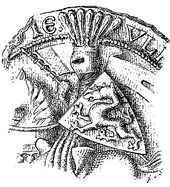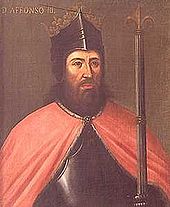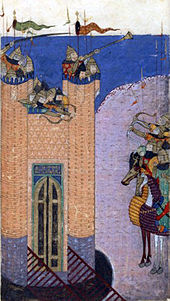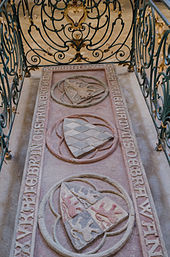1256
Portal history | Portal Biographies | Current events | Annual calendar
◄ |
12th century |
13th century
| 14th century
| ►
◄ |
1220s |
1230s |
1240s |
1250s
| 1260s
| 1270s
| 1280s
| ►
◄◄ |
◄ |
1252 |
1253 |
1254 |
1255 |
1256
| 1257
| 1258
| 1259
| 1260
| ►
| ►►
| 1256 | |
|---|---|
|
The Mongols under Prince Hülegü besiege and conquer the fortress of Alamut . |
|
| 1256 in other calendars | |
| Armenian calendar | 704/705 (turn of the year July) |
| Ethiopian calendar | 1248/49 |
| Buddhist calendar | 1799/1800 (southern Buddhism); 1798/99 (alternative calculation according to Buddhas Parinirvana ) |
| Chinese calendar | 65th (66th) cycle
Year of the fire dragon丙辰 ( at the beginning of the year wood bunny 乙卯) |
| Chula Sakarat (Siam, Myanmar) / Dai calendar (Vietnam) | 618/619 (turn of the year April) |
| Iranian calendar | 634/635 |
| Islamic calendar | 653/654 (turn of the year 29/30 January) |
| Jewish calendar | 5016/17 (September 20/21) |
| Coptic calendar | 972/973 |
| Malayalam calendar | 431/432 |
| Seleucid era | Babylon: 1566/67 (turn of the year April)
Syria: 1567/68 (turn of the year October) |
| Spanish era | 1294 |
| Vikram Sambat (Nepalese Calendar) | 1312/13 (turn of the year April) |
Events
Politics and world events
The double choice of 1256/57
- January 16 : Gerhard I von Dhaun , Archbishop and Elector of Mainz , is taken prisoner by Duke Albrecht I of Braunschweig-Lüneburg . Since he cannot be present at the election of the king in Frankfurt am Main the following year for this reason , he will transfer his vote to Konrad von Hochstaden , Archbishop of Cologne, at the end of the year .
- January 28th : The interregnum in the Holy Roman Empire continues: The Roman-German King Wilhelm of Holland , who was previously in a position to exercise little rulership in the empire and has only achieved general recognition since 1254 , comes after the suppression of an uprising Frisians perished.
- March 18 : Envoys from the city of Pisa proclaim Alfonso X of Castile , who is related to the Hohenstaufen through his mother Beatrix of Swabia , as German king. As a result, there was a double election of 1256/57 : In a letter to Pope Alexander IV , the English King Heinrich III pleaded . to appoint a German king who is not hostile to England . Since Alexander did not react, Heinrich made the decision to have his brother Richard of Cornwall elected as German king. Negotiations begin at the end of June. The election date is set for January 13, 1257.
- November 26th : Ludwig the Strict , Count Palatine of the Rhine , undertakes by contract to elect Richard of Cornwall as German King.
Other events in the Holy Roman Empire

- January 4th : After the death of Bernhard von Spanheim , his son Ulrich III. new Duke of Carinthia .
- May 26th / August 15th : As the federal assemblies are hardly attended any more, the Rhenish Association of Cities begins to decline .
- August 25 : In Bologna the abolition of serfdom is announced for about 6,000 servants . The owners are compensated once from the city's financial coffers. In the following year, the legal text is documented in Liber Paradisus .
- With an arbitration award by the French King Louis IX. The War of the Flemish Succession ends in Péronne .
German medal
- The Teutonic Order conquers the Samland . In the same year Poppo von Osterna resigns as Grand Master of the order. Anno von Sangerhausen , the previous landmaster of Livonia , is elected as his successor .
The war of Saint-Sabas
The war of Saint-Sabas between Venice and Genoa begins. The two maritime republics have been in increasing competition with one another for a long time. The immediate trigger of the conflict is a dispute over the power of disposal over the Church of Saint-Sabas, which is located in the middle of Acre on the border between the Genoese and the Venetian quarters on a strategically important hill. The outbreak of fighting leads to the side of the barons and orders of knights for one of the sides. Although the Templars and Johanniter initially tried to mediate between the Italian republics, they quickly fell on opposing sides after realizing the inevitability of war. The Templars and with them the Teutonic Knights opted for Venice, the Johanniter and the city of Pisa for Genoa. In response to the news of the fighting in Acre, the city lord Philip of Montfort in Tire used the opportunity to drive the Venetians out of the city. In the county of Tripoli , which does not belong to the Kingdom of Jerusalem , the inflamed conflict is creating political waves. Count Bohemond VI. takes sides for Venice, whose vassals from Gibelet remember their Genoese origins and oppose their master. The only neutral authorities are the regent Plaisance of Antioch and the Seneschal Geoffroy de Sergines with his French knights in Acre.
Balkans
- The Bulgarian Tsar Michael II Assen , who lost all of Thrace to the Nicaea Empire last year , is overthrown and killed in a Boljar conspiracy. His cousin Kaliman II. Assen becomes the new tsar. At the same time, other powerful Boljars such as Mizo Assen , Konstantin Tich Assen , Rostislaw and Schischman split off. Kaliman is also toppled and killed that same year. The time under his successor Mizo Assen is marked by separatism and civil war.
Iberian Peninsula
- King Alfonso III moves the Portuguese capital from Coimbra to Lisbon .
Asia
- November 19 : The Mongols under Prince Hülegü besiege and conquer the fortress of Alamut , breaking the rule of the assassins . Their ruler Rukn ad-Din Churschah has to submit to the Mongol Khan in public. After the city was taken, the defenders were gutted and, among other things, the library with valuable scientific and medical works was destroyed.
- The Mongols arrive in Mesopotamia and destroy the Sumerians' irrigation systems, which are over 4,000 years old, so thoroughly that the population drops from 25 to around 1.5 million people within a comparatively short period of time. The plants will never be rebuilt.
First documentary mentions
- First documented mention of Abtwil , Allmendingen near Bern , Aarau , Bernex , Bruneck , Eriswil , Hohentannen , Kriegstetten , Roggliswil , Damscheid and Wikon
- The place Damazan is founded as a bastide .
Culture
- King Alfonso X of Castile uses candle, mercury and water clocks for astronomical observations (see Stein , cultural timetable ).
- around 1256: The Speculum maius des Vinzenz von Beauvais is created, the first and most extensive encyclopedia of the Middle Ages.
religion
- April 9th : With the papal bull Licet ecclesiae catholicae , Pope Alexander IV orders the great union ( magna unio ) of the Tuscan hermits, the Janbonites , the Brictinians , the Wilhelmites and the hermits of St. Augustine. As a result of this merger, the Augustinian hermits emerged as the fourth important mendicant order , alongside the Franciscans , Dominicans and Carmelites .
- October 5 : The Pope forbids the 1255 incurred Tractatus brevis de periculis novissimorum temporum of William of Saint-Amour .
- The main church Sankt Katharinen , one of the five main churches in Hamburg , is first mentioned in a document.
- In Poland, the Koronowo Monastery is founded as a daughter of the Sulejów Monastery .
- The Selnau monastery is founded in Zurich .
Born
Date of birth saved
- January 6th : Gertrud von Helfta , German Cistercian and mystic in the Helfta monastery near Eisleben, saint of the Catholic Church († 1302 )
- March 21 : Heinrich I , Margrave of Brandenburg and Landsberg († 1318 )
Exact date of birth unknown
- December: Al-Marrakuschi , Moroccan mathematician and astronomer († 1321 )
- Adolf VI. , Count of Holstein and Schauenburg († 1315 )
- Robert de Clermont , French nobleman, Count of Clermont-en-Beauvaisis and Lord of Creil-sur-Oise and Sacy-le-Grand, founder of the House of Bourbon († 1317 )
- Marjorie, Countess of Carrick , Scottish noblewoman, mother of King Robert the Bruce († 1292 )
- Philip of Anjou , titular king of Sardinia and Thessaloniki († 1277 )
- al-Mizzī , Arab Islamic tradition and lawyer from the Shafiite school of law († 1344 )
Born around 1256
- Henry de Gray , English nobleman († 1308 )
- Katharina von Habsburg , German noblewoman († 1282 )
- Roger Mortimer of Chirk , English nobleman and rebel, Marcher Lord in Wales († 1326 )
- Siegfried von Eppstein , German nobleman
- 1256/ 1257 : . Casimir II , Duke of Beuthen in Upper and Cosel († 1312 )
Died
Date of death secured
- January 4th : Bernhard von Spanheim , Duke of Carinthia (* 1176 or 1181 )
- January 18 : Maria von Brabant , Duchess of Bavaria and Countess Palatine near the Rhine (* 1226 )
- January 20th : Renaud de Vichiers , Grand Master of the Templar Order
- January 28 : William of Holland , Count of Holland and Roman-German King (* 1227 )
- January 31st : William of York , Bishop of Salisbury
- February 9 . Alice de Lusignan , Franco-English nobleman
- February 28 : Sophie von Weichselburg , Countess von Stein and Margravine of Istria-Carniola (* around 1190 )
- before June 4th: Witiko von Prčice and Blankenberg , Bohemian nobleman (* around 1170 )
- September 1 : Kujō Yoritsune , Shogun of the Kamakura Shogunate in Japan (* 1218 )
- September 21 : William of Kilkenny , Bishop of Ely and Keeper of the Great Seal
- before September 28th: Wilhelm von Tübingen , Count von Gießen
- October 14 : Kujō Yoritsugu , Shogun of the Kamakura Shogunate in Japan (* 1239 )
- October 25 : Thomas de Vipont , Bishop of Carlisle
- November 15 : Ludolf II. , Count of Hallermund-Loccum (* around 1180 )
Exact date of death unknown
- Frederick of Antioch , imperial vicar general of the Mark Ancona and Tuscany, illegitimate son of Emperor Frederick II (* around 1223 )
- Heinrich II. Von Praunheim , German nobleman (* around 1200 )
- Hugo von Digne , French Franciscan
- Jakob ben Abba Mari Anatoli , Provencal doctor and religious philosopher
- Kaliman II. Assen , Tsar of Bulgaria
- Constantine Maliasenus , Byzantine aristocrat and magnate in Thessaly
- Li Zhichang , Chinese Daoist and travel writer (* 1193 )
- Michael II. Assen , Tsar of Bulgaria (* around 1238 )
- Nadschmuddin Daya Razi , Islamic mystic
- Niall, Earl of Carrick , Scottish nobleman
- Rhys ap Gruffydd , Welsh Lord of Senghenydd
- Johannes de Sacrobosco , English mathematician and astronomer in Paris (* around 1195 )







